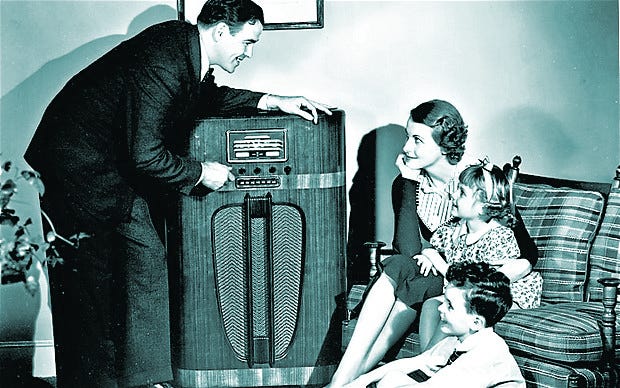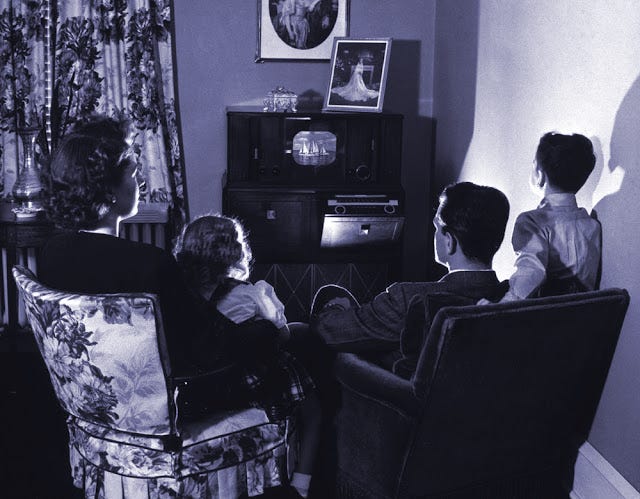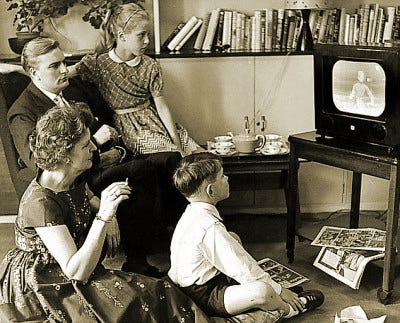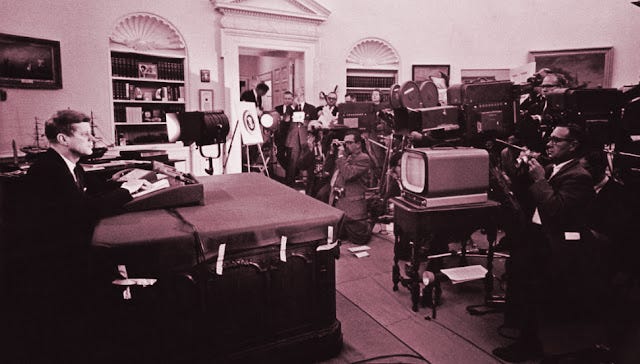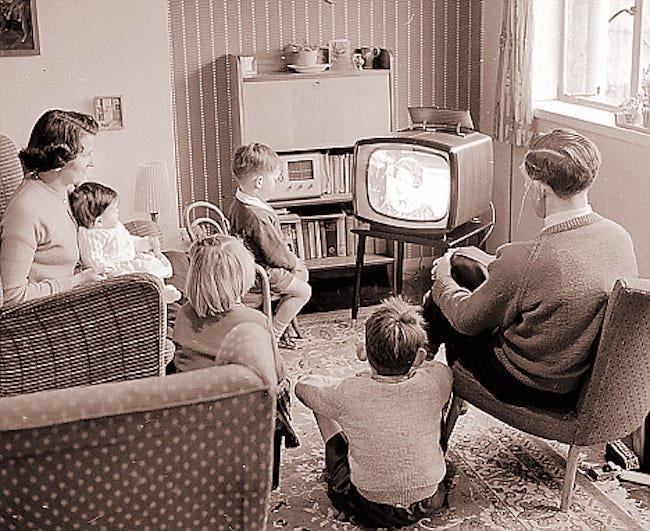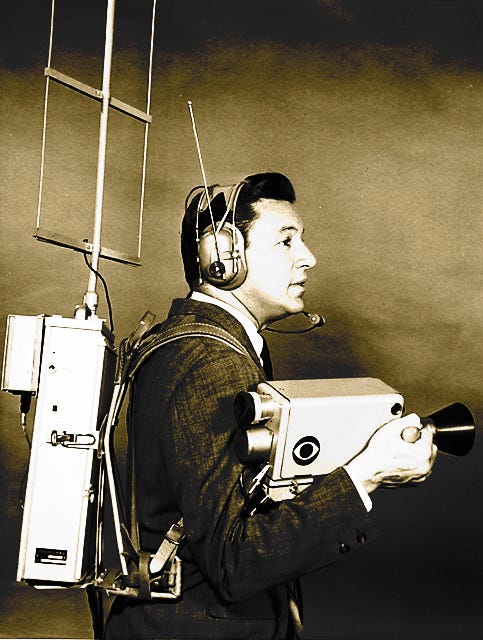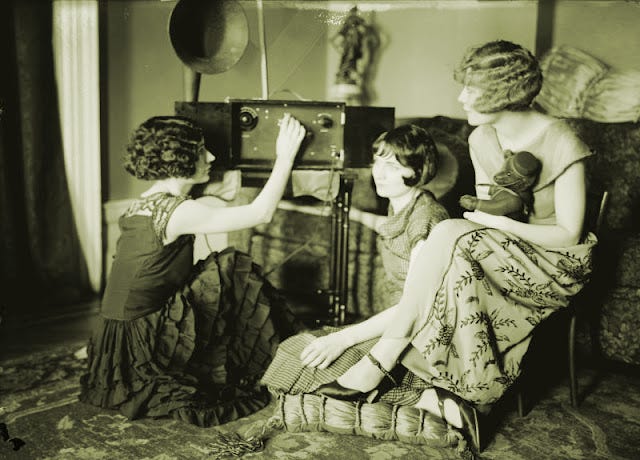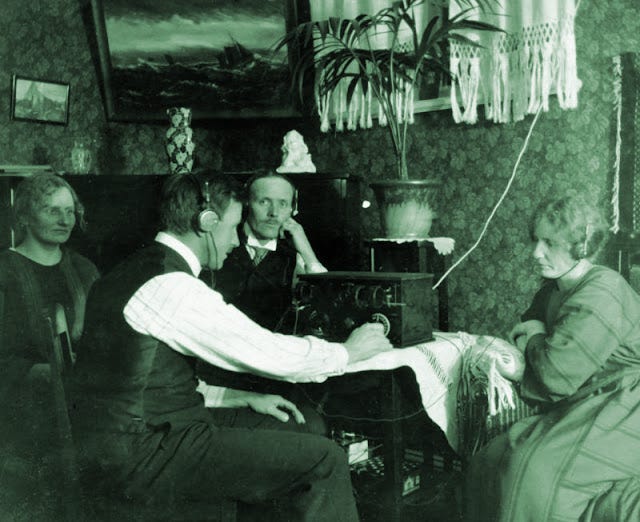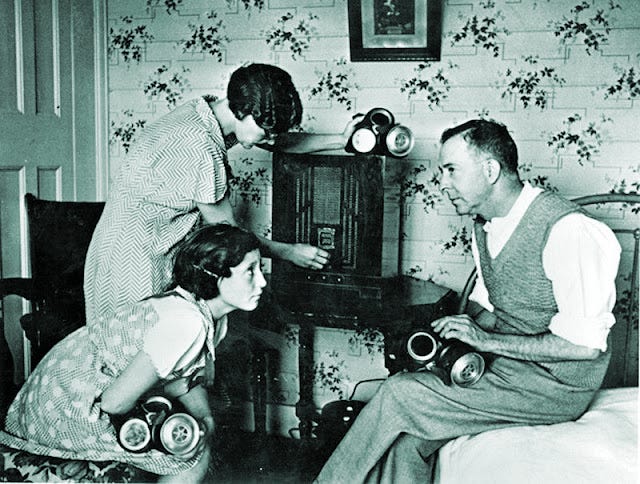How to Make Sense of the World: The Case for Reading the News
The U.S. presidential election is a year away. If that doesn’t give you the shakes, this might: Consider for a moment how it may seem like half of your relatives appear to have become insane in the last decade. Doesn’t it seem like you and everyone else has at least one “crazy uncle”? And yet, this should also give us pause: What if we are actually that person?
Lord, is it I?
The basic problem is this: It would be a lousy bet to assume that everyone else has gone mad about political affairs and we, in our rarefied way, are somehow immune from such deceptions and delusions. So, how can each of us check our crazy uncle and aunt vibes? How do we make sense of the world? How should we? How might we rise to fulfill our higher calling to become what Michael Schudson, in his classic history of American civics, describes as the Good Citizen? In short, how should each of us seek to better understand the world so that we can best fulfill our moral responsibilities to neighbors, strangers, and the needy through a more abundant, engaged civic life?
This piece addresses a small but necessary part of that puzzle: The news we trust matters.
Consider how tricky this can be. If we read no news, we will tend to be poorer citizens voting on the fumes of our upbringing mixed with rumor and folklore. If we read a lot of news, we are likely to feel more anxious, depressed, and distrustful. And, worse still, if we get just any news from anywhere, our cheap, chance consumption will likely lead us to either unknowing cynicism or foolishness, where our attention and our votes will be shaped by and serve not reality but the media economy of headline hype cycles, social media algorithms, and convenient echo chambers, or what Nate Oman recently called the “Hellscape’s business model.”
So, if it does no good to read no news, all the news, or just any news, clearly we need to read some news. But which news can we trust? More to the point, which subset of news is trustworthy? And, most crucially, how do we decide this question in ways that prioritize self-checking reality over personal political convenience and bias?
The short answer: subscribe and then read professional news that, in a triangulating way, corrects more than it confirms your political inclinations. Certainly don’t watch only your favorite. Also don’t read just your opponent. Read locally, globally, and across both national aisles.
All sustainable actors or organizations must self-correct; so read the news that corrects itself and then also corrects us.
The rest of this piece is a practical how-to guide. It is inspired by the most recent Oxford Reuters Institute report on trust in news (written for news organizations), and it builds on and adds to the tips on how to read the news outlined in this Public Square post from last campaign season (written for news readers). We also write this as two people with decades of combined experience in researching news, media, and society. Our essay’s advice, if implemented, might require a modest outlay in cost (a few dollars per month) and time (a few hours per month). It might also base our polity in a greater dose of reality.
Here are eight strategies for how, if at all, to trust the news:
1. Pay for the news, for not all news is alike.
2. Subscribe first to the local newspaper (or a suitable local nonprofit news outlet), then read internationally.
3. Subscribe to two or more print news sources that check each other and triangulate your biases.
4. Read, don’t watch the news.
5. Don’t skip but do read the news in small doses.
6. Extend trust to professional news outlets independent of their politics.
7. Turn off triggering social media accounts and seek sources of sane correction instead.
8. Don’t be a fool or a cynic.
1. Pay for your news, for not all news is alike.
You’ve heard the phrase about social media platforms: “If you’re not paying for the product, you are the product.” Well, the same could apply to other forms of information, including news: If we’re not buying it, our news is selling us, not the news.
Professional news outlets that trade in expensive, fact-checked reporting want our money or our taxes. If that sounds bad, just wait: The free news outlets want your brains. Free headlines are selling our attention to the highest bidder (whether advertiser or philanthropist). Zombie news sources include a wide range of free-to-read online sites, but especially those that are partisan in their framing, with little apparent commitment to longstanding journalistic principles of fairness and facticity. Examples include sites like Newsmax, Breitbart, and Zerohedge aimed at Republicans, as well as the likes of Tony Michaels (the “Rush Limbaugh of the Left”) catering to Democrats. Even more reputable sources of free news — like the big broadcasters (ABC, CBS, NBC) — can too often traffic in scare-mongering tactics because their business model relies on attention. And cable television, for sure, can fall in this category of attention-mongering: MSNBC may be iffy at times, but Fox News is hardly news at all (in fact, Fox-only viewers have been shown to be more poorly informed than people with no media). So, avoid the zombie news sources that, promising free stories, lure us in with a good scare and then eat our brains (so to speak) by profiting off of our cognitive patterns.
A healthy media diet starts with Reuters and the Associated Press, reliable sources for fact-checked news that often end up informing many other news sources. As wire services, they rely on support from the subscribing newspapers and broadcasters that use their content, so they are not so pressured to traffic in attention-seeking. The next best bets are NPR, PBS, and the BBC, whose funding comes from private revenue, donations, and, in the U.S., a very small portion from taxes. These fact-based reporting outlets include addendums, corrections, and discussions of previous mistakes. Here’s a recent NPR story, for example, where NPR covers its own coverage, acknowledging it too had boosted a story that turned out poorly, even tragically. It is just professional commonsense: “the first rough draft of history,” as Philip Graham described journalism, is bound to arrive with errors, so beware any source (especially ourselves) that does not openly check or correct itself.
What does one do with errors? When our news sources publish error corrections and coverage reflections, they are signaling their seriousness, not sloppiness or carelessness. (By contrast, Newsmax apologized to Eric Coomer for falsely accusing him of messing with 2020 election results only after legal pressure forced it to do so — and then Newsmax dropped the retraction from its website.) It’s a basic Boy Scout ethic: clean up any mess and leave the trail a better place than you found it. Would you rather hire an air traffic controller or heart surgeon who can list their errors, or one that denies, defers, and insists they never made any errors? Similarly, news sources that cover or deny their errors, their liability, or shift the blame, are objectively worse, because their pretense to credibility is their greater deceit. If our doctor doesn’t have liability insurance, our surgery might just be happening in the proverbial back alleyway; by analogy, if our news sources don’t correct themselves, they will be eyeing the exit after they fail us. If we’re not paying for self-correcting news organizations, we’re unknowingly paying a lot more.
2. Subscribe first to the local newspaper (or a suitable local nonprofit news outlet), and then read internationally.
Our social worlds are both a lot bigger and smaller than the U.S. national debate stage, so subscribe to your local newspaper first and then read internationally. The local news economy has been struggling for decades across the world; this is a significant problem since all news begins local. If the communities where we live cannot sustain local news environments, maintaining the means by which a community self-corrects and coheres will be harder, so start with a (digital or paper) subscription to the local newspaper (typically about $10/month or less). Chat with a local reporter at a city council meeting; you’ll learn they often lead hard but dignified careers.
Keep in mind that in many U.S. communities today, there are so-called “news deserts,” where sources for regular, professional news coverage have either vanished, or have become a shell of their former selves. This is largely because hedge funds and corporate conglomerates have bought up many newspapers in recent years and bled them dry with rapacious budget cuts. Consider the plight in Eugene, Oregon, where its longtime newspaper, the Register-Guard, once considered one of the best newspapers in the Pacific Northwest, “today has no local editor, no publisher, no physical newsroom and little love from a dismayed citizenry. The news staff that once exceeded 80 now stands at six.” Ouch.
So, while it’s good to support your local newspaper in whatever form it remains, you may also find that some of the most energetic reporting on your community (or your region) is being done by nonprofit digital startups. You can find a list of these nonprofits via FindYourNews.org. Even formerly for-profit news companies are transitioning to nonprofit status to build a different type of relationship with their supporters in the community—as when The Salt Lake Tribune in 2019 became the first legacy newspaper in the U.S. to switch to a 501(c)3 nonprofit. If you find a nonprofit doing good journalism on a regular basis in your area, you can become part of its long-term sustainability by donating.
At the same time that we buy local, read an international news source or two, preferably not in English. The USA houses only 5% of the world population: what portion of our views about the broader world should be dominated by what we gather from American media and politics? Perhaps a bit more than 5% but definitely not too much more. Subscribing to a local newspaper and reading international headlines triangulates beyond the mainstream national news market for which internet and media conglomerates overproduce. Most of these fine international sources have a free subscription option: BBC, Al-Jazeera, Sueddeutsche Zeitung (Central Europe), Africa News, Kyiv Independent, Johnson’s Russia List, and the Sinocism Substack newsletter, among many others. For those interested in news media as such, browse the Reuters Institute’s data-informed reports and news commentary from Nieman Lab or the Columbia Journalism Review. The next step will go a long way, too.
3. Subscribe to two or more major news sources that check each other and triangulate across our biases.
In other words, pay for two or more sources from opposing perspectives, but do not for a moment imagine that the goal is to zero out the headlines to some averaged political centrism. Rather, the goal must be to better understand fact-checked reality in full light of its many asymmetries. While we join many experts in taking issue with the underlying assumptions behind the graph that supposedly illustrates media bias (of note: the “left-right” political spectrum is an incoherent myth, as scholars Verlan and Hyrum Lewis show), a fair first step would be to subscribe to two or more major news sources from central opposing sides in the top green section in the Ad Fontes media bias chart. Distinguish original fact-based reporting from opinions and editorials in these sources. NPR, for example, has world-class, fact-based reporting as well as a predictable slant in its separate editorials, a distinction that its critics often elide in trying to diminish its excellent fact-based reporting. For fact-based reporting, subscribe to the BBC, NPR, and PBS; for reflections on society and the political economy, try The Washington Post, The Wall Street Journal, and The Financial Times; for commentary on society and global affairs, subscribe to The Atlantic, The Christian Science Monitor, and (especially) The Economist. Here’s a list by size of 2023 paywalled subscription news services in English. Do more than just reach across the political aisle. Subscribe to more than one professional source for regular reminders that reality has more than two sides. (The number of sides on, say, abortion, immigration, and guns is virtually as many as there are people affected by those issues.)
4. Read, don’t watch the news.
On average, reading quality print news sources will interrupt our reactions, make us more careful, and leave us better informed than watching its equivalent on a screen (the exception may be extended interviews with candidates, but beware the circus debate stages). All news (including television news scripts) starts as a piece of writing, and reading the news both requires and rewards a bit more brain power. Reading actively transforms visual symbols on the page into the interiorized voices of silent reading. This process interrupts our reaction cycle and invites slow, careful processing that precedes interpretation. Watching, by contrast, requires just keeping our eyes and ears open. Many local television news broadcasts—especially the soundbites and “if it bleeds, it leads” headlines—already follow a nationwide basic script (much of which is syndicated). Little on television is genuinely local, because we don’t pay for much local. So once you’ve subscribed to the local script (i.e., the newspaper), cut out the other middlemen and read higher-quality scripts yourself.
It’s basic economics: fact-based reporting is more expensive than television commentary. It takes a GoPro camera and a YouTube account to anoint oneself the next hot-button commentary news channel in the always-on 24/7 television news environment. (To wit: although it’s an apples-and-oranges comparison, Tucker Carlson arguably now nets more viewers on his YouTube channel than on his former network). By contrast, to break a news story based in reality, a news source has to send a reporter to the local news site, support a network of foreign correspondents, meet with eyewitnesses, check secondary sources, and lean on an in-house team for fact-checking, revision, and editing the print. All that is expensive. Of course, unless we are selective, print can be nonsense too, but so long as we understand that we need to selectively consume some news, not any news, the bet should be obvious: The average 10 words of fact-based print news are worth more than the average 10 minutes of free YouTube news commentary. Arguably far more. The first has to keep smart readers subscribed month after month for new insights, the second only has to keep us angry or entertained enough to sit through the next commercial break.
5. Don’t skip the news, but do read it in small, limited doses.
If we find ourselves feeling stressed while on social media or thinking too much about the news, take a planned hiatus for a few weeks. When we come back, we can use a time-blocker app (like one of these) that lets us receive our news only once a day, say, for half an hour in the morning or evening.
Or, consider the “Slow News” movement. It encourages people to detox from news addiction—so common in a world of ever-frenetic breaking-news notifications lighting up our phones and social feeds—by taking a more deliberate approach to news consumption. One way to kick the habit is to limit ourselves to getting news just once a week.
News, after all, is a necessary ingredient in an informed citizen’s diet, but only a part. Remember this maxim? “Eat food. Not too much. Mostly plants.” That was how Michael Pollan famously cut through the complexity of what humans should eat to offer a simple prescription for maximal health. We think a similar injunction can work for news consumption: “Get news. Not too much. Pay for it.” (That last bit, with a bit more detail: “Mostly from fact-based professional sources that you pay for.”)
6. Extend trust to professional outlets independent of their politics.
Just because a news source is not aligned with my politics does not mean I may reasonably suspect it of being unprofessional or wrong. This point cuts in several directions. For example, Tim Ballard, a prospective candidate for the Utah Senate, continues to deny that the Church of Jesus Christ of Latter-day Saints made a statement denouncing him for “activity regarded as morally unacceptable,” despite the fact that the denunciation has been credibly and repeatedly confirmed by multiple sources. So far his denial of the denunciation follows the usual formula: in order to refuse a message (the content), attack the messenger (the channel). Namely, Ballard and some of his conservative supporters have jumped to conclude that the denouncement itself must have been a forgery or a fake since its source was liberal Vice. This assumption is false; the Church statement is real. (This happens all the time: back in 2016, LDS conservatives criticized a non-LDS commentator for praising LDS voters simply because their praise appeared in Huffington Post.)
Let us tread the fine line between two common mistakes: First, if we assume all news is true, we may fail to recognize or interpret its biases. Second, if we assume that most news that corrects our worldview is “fake” because, we claim, it comes from a “biased” source, we are bound to routinely and mistakenly dismiss legitimate news as illegitimate, especially when that news is inconvenient to our prior beliefs. (The term “fake news” is a hall of mirrors and should disappear from everyday conversation.) Given that we must want news to correct and inform our worldview, the first error can be mitigated by clearing professional paywalls, but the second error requires us to seek correction ourselves. In other words, we can manage bias simply by observing it, paying for the best, and checking our biases against others’—but democratic republics cannot thrive when a large portion of their people insist that reality is fake.
So, don’t forget that news organizations face liability and defamation suits for fabricating or falsely attributing statements. Similarly, journalists at professional news organizations, who often lean liberal personally, also promote their careers by breaking the story as correctly as they can. It is an old Sunday School lesson: let us be slow to dismiss faithful sources of truth simply because they do not share our own biases. Professionals offer checkable slants and necessary facts at the same time. Not all criticisms may be dismissed as politically motivated; and indeed, so long as they are grounded in factual reality, not all politically motivated criticisms should be dismissed. With reality-based self-correction as the goal, the political biases of self-checking professional sources help good citizens manage sources for their own self-correction. Don’t blame or dismiss serious news for having bias; expect it, observe it, and use that bias to improve and correct our own. Rare is the crazy uncle and aunt that credits and corrects their prior beliefs.
7. Turn off the triggering social media accounts. Seek sources of sane correction.
Social media springs traps in both extremes: Perhaps the only thing worse than a forum overrun by trolls is a univocal forum without any dissent at all. Trolls depend on the fact that the opposite of a false claim is usually another false claim, just as social media companies profit off the equally ruinous fact that if they nudge us all into echo chambers, we have no grounds for realizing when our self-evident truths are, quite often, neither self-evident nor true.
Unless one happens to be an expert or follow other experts on highly specific topics, log off of social media, get print news through subscriptions, and, at the least, heavily curate the social media feed to follow experts promoted for correcting themselves. A dopamine drip from cute animal photos (Instagram before 2019) will not poison relationships as quickly as angry clickbait about the world (most social media now, especially after Elon Musk renamed Twitter for the cancel button “X”). So use restraint before we farm out our minds to algorithms that profit from leading us to bar-fight forums where our rage generates clicks or to unchecked echo chambers where the algorithm profits off our endless scroll. Boxing rings (argument as sparring matches) and North Korean party congresses (all consensus) are awful ways to learn about the world. Mute those personal accounts that appear unwilling to modify their own positions, and follow professional accounts that correct their own views and challenge our views using evidence and careful inquiry.
8. Be neither the cynic nor the fool.
The cynic refuses to trust no matter what and the fool trusts no matter what. Can we start by admitting our own biases and then working to check them? By working to correct these biases with self-correcting stories about reality, we might just build out a mental worldview to become a better citizen.
Consider how similar the cynic and the fool are, despite being opposites. First, the cynic believes that all news sources are bad, insulating themselves in a self-justifying cocoon of ignorance. Anytime a cynic hears a claim that might correct their worldview, they first (accurately) claim that that information came to them through a news medium of some kind, and then, in a desperate wrong turn, seed all or most news media with suspicion and therefore wrongly conclude that the information inconvenient to them is therefore wrong or suspect. Cynics most commonly suspect that since news management or ownership is corrupt, therefore (they wrongly conclude) all or most claims produced by the journalists they employ must be somehow corrupt. Nonsense. Cynicism shuts our eyes to the simple fact that there must be better and worse ways to make sense of the world and that some news brands are empirically preferable to others. The quality of news cannot be reduced to my ideological convenience if I am to know its quality at all. Trust is fragile, self-reproducing, and essential to any functioning modern society. Undifferentiated news cynicism (which throws away the trustworthy stuff because much that calls itself “news” is a free brain-sucking zombie brand) frays our broader social fabric of trust, which is slow to mend itself once lost.
Second, fools have the opposite (and thus somewhat similar) problem: Fools trust almost any hook or headline that comes across the transom. If it sounds too bad or too good to be true, it probably isn’t true. (But don’t let that caution lead to meta-cynicism. Remember that most fact-reporting news claims are credible and that even a few incredible claims are also true and therefore require our careful and deliberate action, not cynical rejection nor foolish embrace.)
To avoid playing the fool, we may be slow, even very slow, to share headlines we agree with. To avoid playing the cynic, be slow to share any headline we disagree with. Instead, might we try sharing only those headlines which somehow correct what we previously thought? As Timothy Snyder points out, both cynics and fools often repeat (i.e., share on social media) meme-length mottos and bumper-sticker phrases without restating or improving the point in their own language; the cynic does so sarcastically, the fool shares sincerely. Sarcasm speeds rage comments, and unthinking sincerity breeds groupthink. Both fools and cynics cede their mental processes to the zombie algorithms: Of the many organizations attempting to influence what we are thinking at that moment, we the foolish and cynical take the least responsibility of them all for checking our own thoughts.
We must take responsibility for our thoughts by seeking the sources and the methods worthy of trust by which we can self-correct and inform ourselves about “the world outside of our heads,” as Walter Lippmann quipped in his masterwork Public Opinion just over a century ago. There’s nothing easy about remaining curious enough to keep learning, confident enough to act responsibly and humbly in the face of uncertainty, and continuously watering the ground from which springs our commitment to try to use what we know and do to serve others. What higher standard could exist for the maturing good citizen than self-correction?
It’s early November 2023. Prepare today for what’s coming in the next twelve months. Unsubscribe today from all the free toxic flotsam. Budget appropriately, and subscribe to a few politically complex fact-based news sources (especially the local paper). If the last two campaign seasons are any indication, what will happen this coming year across 50 major elections worldwide is predictable:
We can expect that many U.S. citizens, with dignity and ears open to one another, will engage in some necessary negative partisanship and political conversation that over-privileges the national ballot in an effort to get out the vote against the worst candidate (as Madisonian party system requires). Some of this political discussion will be healthy and useful.
At the same time, we can also anticipate waves of relatively comfortable folks repeating, often in near verbatim, choruses of wild claims about monstrous evils, looming threats, and utopian promises running amuck about society “nowadays.” These arguments will intensify the ongoing tornado of unnecessary negative partisanship. It’s coming. Buckle up, but don’t panic. Spend the next week unsubscribing from all the zombie news sources. Instead, pay for a healthy media diet of facts and self-checking stories.
Overall, when it comes to which news sources we should trust to inform ourselves about the world, “no one size fits all,” as Oxford’s Reuters Institute report concludes. This is, despite some stress, good news. It means the world remains bigger and more beautiful than any one person’s understanding of it, and it is our profound privilege to try to refresh the good in becoming a “good citizen”: not a self-righteous, self-assured sense of “good,” but a curious, self-checking, informed good that starts following words of wisdom that lead to a healthier media diet.
Here are those tips again:
1. Pay for the news, for not all news is alike.
2. Subscribe first to the local newspaper (or a suitable local nonprofit news outlet), then read internationally.
3. Subscribe to two or more print news sources that check each other and triangulate your biases.
4. Read, don’t watch the news.
5. Don’t skip but do read the news in small doses.
6. Extend trust to professional news outlets independent of their politics.
7. Turn off triggering social media accounts and seek sources of sane correction instead.
8. Don’t be a fool or a cynic.
An abridged version of this essay can be found here at Public Square.
Seth Lewis is the Shirley Papé Chair in Emerging Media in the School of Journalism and Communication at the University of Oregon. He is co-author of News After Trump (Oxford University Press) and co-founder of the Substack newsletter RQ1.
Benjamin Peters is a Wayfare Associate Editor. He is also a media scholar, author, and editor interested in Soviet century causes and consequences of the Information Age.
Art curated by Jon Forsyth.




